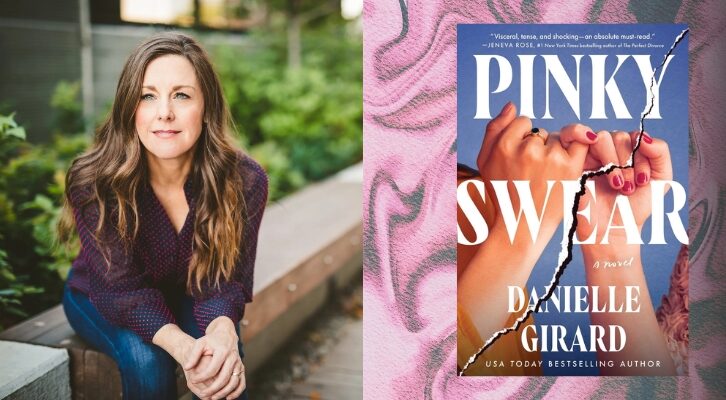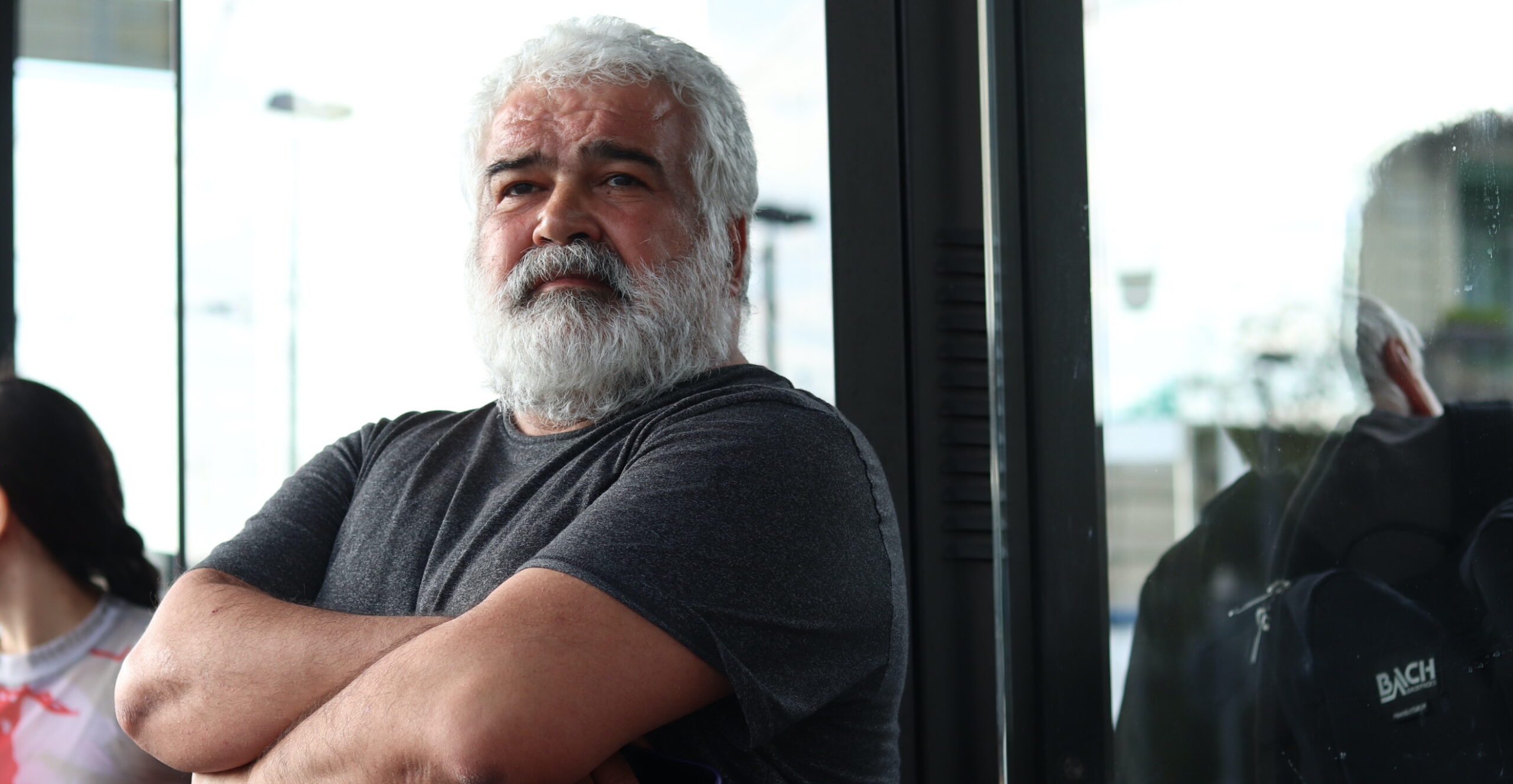
How Syrian Writer Khaled Khalifa Navigates Exile Abroad and At Home
Alfred J. Naddaff Spends 72 Hours in Zurich With the Chronicler of Modern Syria
In the winter of 2016, Syrian novelist Khaled Khalifa, while attending Harvard’s Scholar’s-at-Risk Program, visited my college in North Carolina. His trip coincided with a blizzard and parents and administrators were panicking about whether children could make it to school safely, as the sunny state was largely unequipped to handle the snowstorm. While on our way to a screening of his miniseries to students of my first-year Arabic class, Khalifa slipped on ice and his dark humor crept it.
“Parents here are panicking about their kids making it to school through snow while children in Syria are making it to school while risking bombs falling on their head,” Khalifa remarked.
In the seven years since our first encounter, Syria’s revolution has been exterminated with barrel bombs. Today, Syria’s neighboring Gulf countries—which once backed various anti-government rebel groups—have about-faced, welcoming Assad back into the Arab fold, tabula rasa. Their message: Assad won the war, and it is economically beneficial to accept this.
Many Syrians disagree, especially the more than a third who are refugees living abroad, for whom return remains precarious. This is realpolitik in real time. Despite the declaration, the war is far from over. Syria is divided into three mini-states with at least five foreign armies, militias, and bases.
During his visit to the U.S. in 2016, Khalifa could not stand to be away from his country for too long and truncated his program at Harvard to return. In fact, one of the most distinct aspects of Khalifa’s biography is that, as his friends have died or migrated, he always returns, enduring a sort of exile at home.
Since we last met, Khalifa has written three award-winning novels and has been translated into 20 languages. He has over 13,000 followers on his Facebook account, and cultivates a vulnerable, open persona online. He is known as one of the most distinct chroniclers of Syria, expanding his pre-war reputation for his dramatic miniseries and novels as an author of international acclaim. All his books are banned in Syria.
His series Sirat al-Jalali (Portrait of the Jalali Family, 2000) and Zaman al-Khawf (A Time of Fear, 2007) challenged taboo subjects in Syria, directly addressing the regime’s combat with the Muslim brotherhood and 1982 Hama massacre that killed at least 10,000.
Khalifa complicates the binary between dissident writer in exile and at home.
“Even at that time he was dedicated to chronicling Aleppo’s lost history.” By the time he was in his mid-thirties, “people were saying that he had suddenly made a huge splash on the cultural scene and recognized him as a literary giant among them,” said Rebecca Joubin, a scholar of love, metaphors and politics in Syrian television drama.
With his taboo-breaking works, Khalifa, now 59, continues to challenge the iron-fisted, 50-year-rule of the Assad dynasty (from father to son), sectarianism, Islamism, and various forms of sexuality, as well as universal themes of friendship, fear, and loss of hope. He publishes in Lebanon. This kind of arrangement is hardly surprising or rare in Syria, and all his books get smuggled back into his country. The international acclaim allows him to maintain a critical stance and stay in Damascus, which has long housed opposition thinkers while exiling them too. Khalifa complicates the binary between dissident writer in exile and at home.
When we met in 2016, Khalifa was working on his novel No One Prayed Over Their Graves, to be published in English on July 6 by Farrar, Straus, and Giroux. It is Khalifa’s boldest merging of fiction with history—not a historical novel, he insists, but one about a writer’s return to the past as the Syrian war rages around him.
“We need to return to history but also contemplate it to understand what is happening today. There has always been motivation for an independent, civil, democratic country, not one built on fundamentalism,” Khalifa says, detailing his attraction to Aleppo in the 19th century.
No One Prayed Over Their Graves recounts the story of Hanna, a once-wealthy libertine who becomes an ascetic-mystic. Hanna navigates life before and after a devastating flood that reshapes his multi-religious hometown of Aleppo at the beginning of the 20th century. The novel took Khalifa ten years to write and was published in Arabic in 2019.
On the occasion of its publication in English, we met in Zurich in June. For a long time, I had wished to thank Khaled for our first encounter. His lasting impact on my academic life had been profound: I spent seven years studying the Arabic language and could now speak it with him.
Solidly built, with a thick white beard and black eyebrows, Khalifa projects amo, or colloquially, Big Arab Uncle Energy. He grabs my smaller carry-on which contains maple syrup, a gift that I hoped would reflect my New England provincialism, and pays for my 14-euro day pass from the automated kiosk.
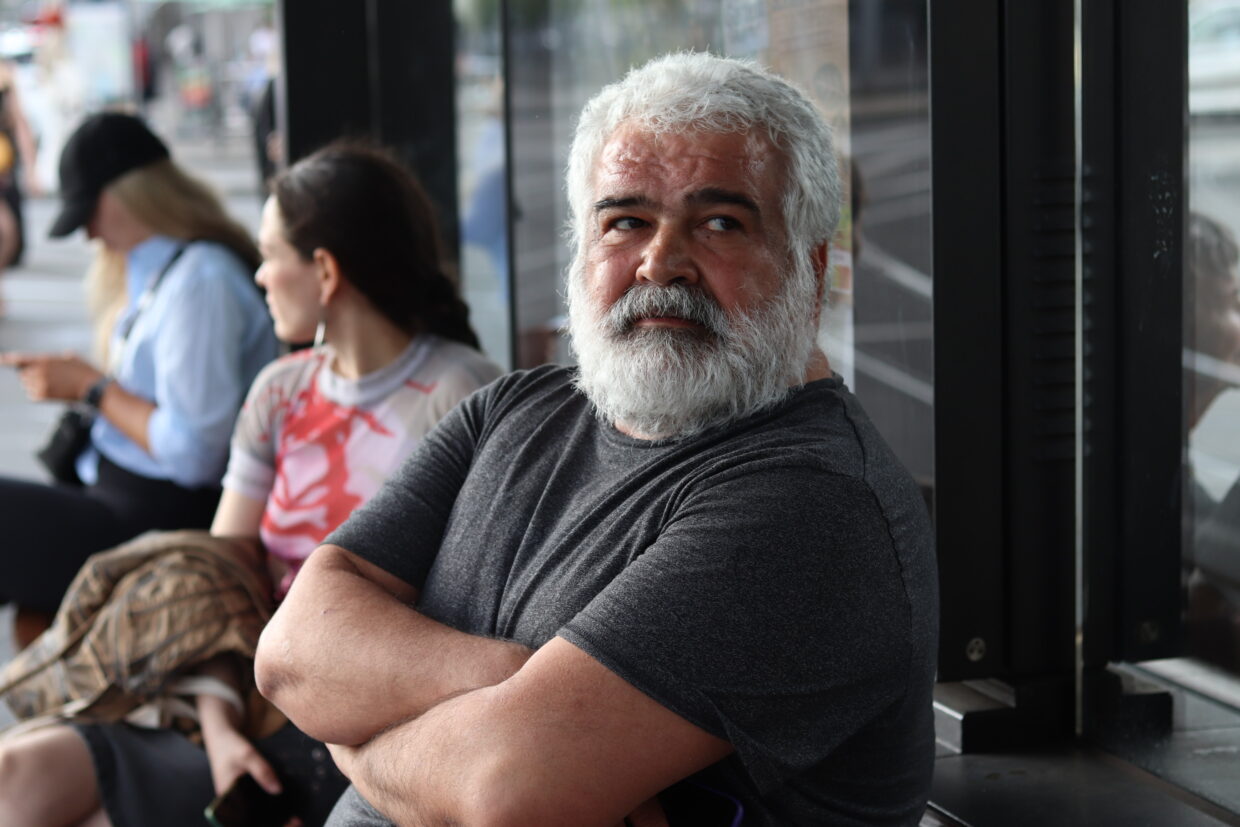
After 30 minutes on a tram and a bus—Swiss transportation runs like clockwork—we reach his apartment, provided by the prestigious Swiss writer-in-residence program Literaturhaus Zürich. It is tucked on a hill near a church, a middle school, a Le Pain Quotidien café, and tree-lined streets. The apartment dates back to 1930. Its windows are cracked since condensation easily forms in certain areas. He points to the living room couch where I will sleep. The room is austere, its walls white and bare, except for a large bookshelf of works by many Lituraturhaus alums including Xiaolu Guo, Maaza Mengiste, and Teju Cole. Resting on the wall is a large canvas with three acrylic paintings of abstract faces.
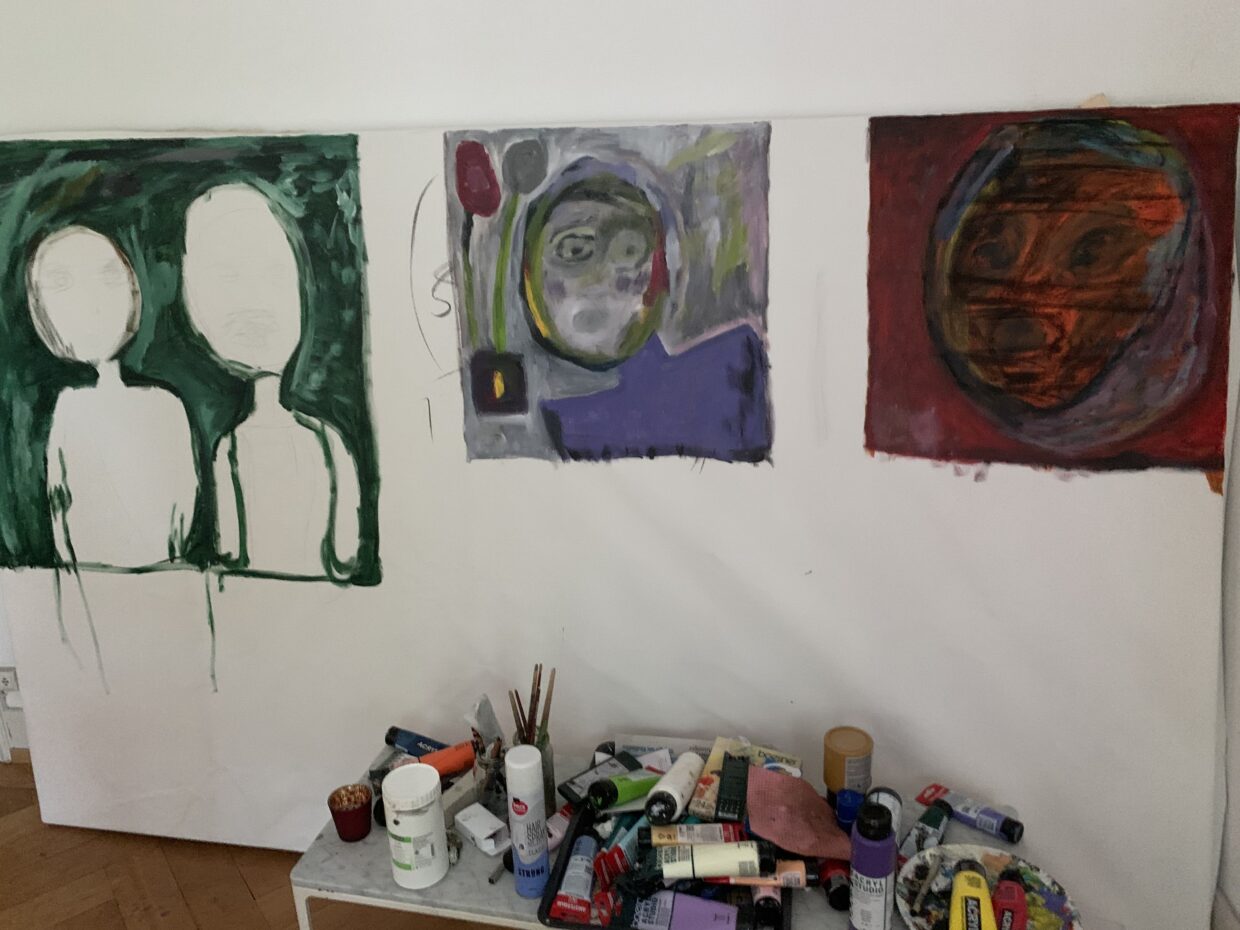
I can see the effects of war on Khalifa: he looks a lot older, his once-steel-gray hair and beard now short and platinum white. His eyes no longer twinkle. He wipes his forehead with a roll of toilet paper and emerges to get the food from the kitchen. We are having leftovers, baqaya, for lunch. The Spanish word paella comes from this Arabic word for leftover, joining the long, shared history of war and cultural exchange. Chicken, potatoes, Swiss sausage and cheese, and a fried egg. He eats quickly and then pours the rest of the food from the tray onto my plate.
From outside, I hear a dove coo. It is not lost on us that Switzerland is the only European country that was unscathed by both World Wars and boasts one of the strongest financial systems in the world. Yet, as Khalifa reminds me, it is also the country of hushed money laundering where corrupt Arab leaders—the Assad, Mubarak, Beni Ali, and Gaddafi families, as well as Lebanon’s central bank governor—long confided in its banks because of their secretive laws. Private banks have grown stricter about money laundering in the aftermath of a global regulation crackdown and have frozen many accounts.
Later, we attend a student art opening at the prestigious Zurich University of the Arts, home to a vibrant contemporary art scene. We are there to support the art project of the sole Syrian student in the program, whose topic is related to dialogue and conflict resolution. Growing up, Khalifa, who hails from a family of nine boys and four girls, did not receive immediate support from his parents. He was still willing to risk everything, even problems with the regime and poverty, for the sake of his craft. As one of the Arab world’s most formidable writers and public intellectuals, he enjoys mentoring the younger generation.
After midnight, the mood for painting strikes Khalifa. He gets up to work on his canvas, mixing red and orange to paint a figure that looks masked. Khalifa embraces painting now, a desire he suppressed for decades because he “always believed and still believes that writing demands everything from the author.” On the first day of the coronavirus lockdown, he seized the opportunity to return to his childhood love of painting, and now dreams of exhibiting his work. Like his writing, his painting starts spontaneously with no destination in mind. He suddenly asks me a question.
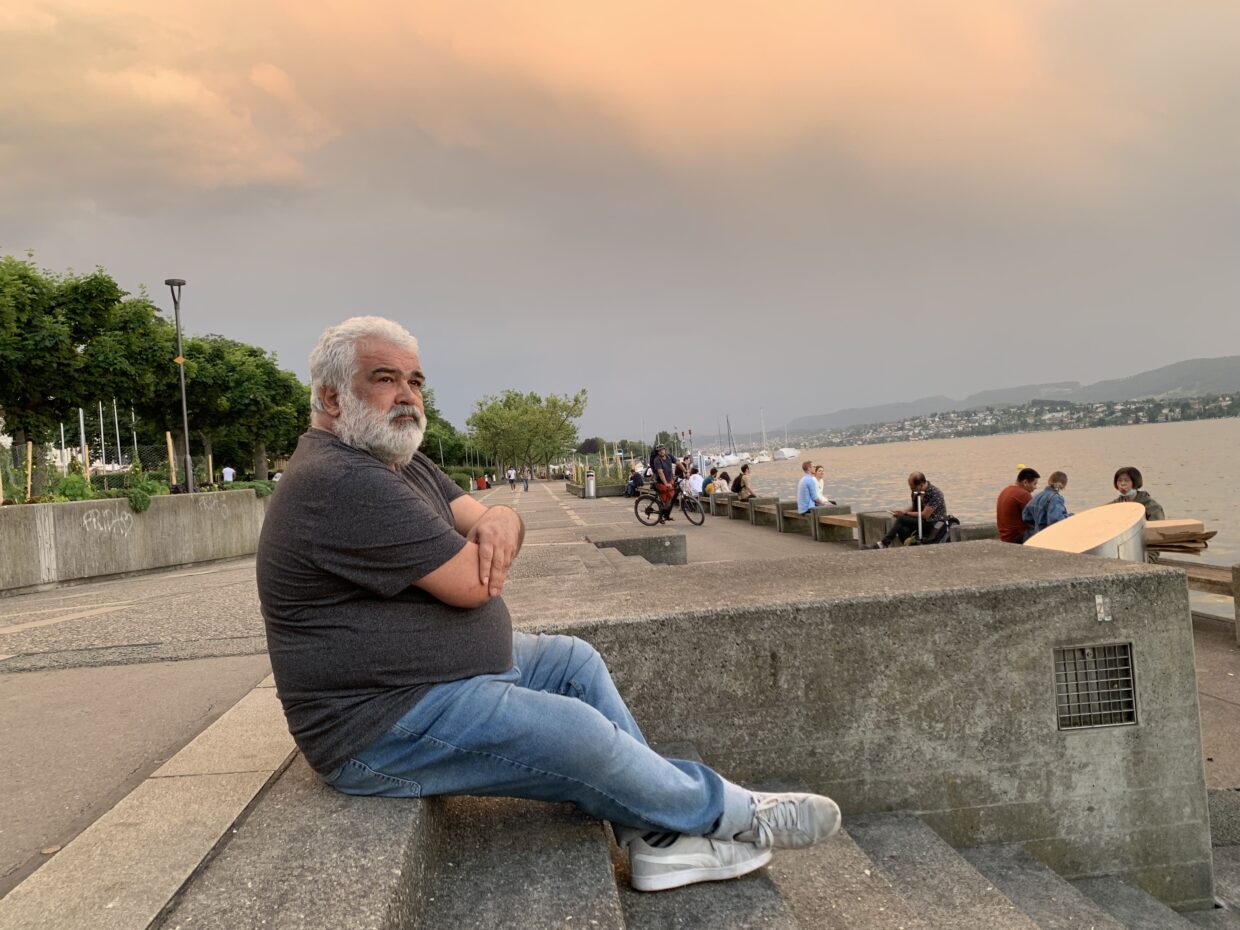
“Do you really love your girlfriend?”
I say yes, and he tells me that he has always been afraid of love but now things are different. “I have become a lot like Hanna from my novel,” he remarks. “I find myself sometimes sitting alone for hours on end contemplating the color of the sky or the ocean.”
I cannot help but think that Khalifa has become a version of 19th-century romanticist who regards love as a central condition of our human nature, even in the face of war. In No One Prayed Over Their Graves, Hanna loses his pious Christian wife and infant son to a flood that destroys their entire village. The flood not only drowns his family but also “all his sordid and riotous past, his entire life. A desire welled up in him for a new one.”
The next day, after Khalifa rejects my proposal to visit James Joyce’s grave, I go to the famous Café Odeon, where Dada and Swingli artists used to gather during the first World War. A few blocks down is the Literaturhaus where Khalifa writes, at least four but sometimes up to seven hours a day. A disciplined commitment to writing is the only thing that has stayed consistent in his life over the decades.
Back in Syria, for 13 years, he would write at a café known as the Journalist’s Club before the war, but quit the place when it turned into a tacky cabaret and gathering point for intelligence officers “unfit for its long history.” Most of his time in Switzerland has been spent writing, “embracing the bourgeoise environment” that contrasts Damascus in every possible way. He has been working on his third long novel during his time in Switzerland.
While I am gone, Khalifa spends all afternoon cooking. I come home to delicious wafts of a potato and chicken casserole. On the table is a hummus bowl drizzled with olive oil and topped with whole chickpeas, a Greek salad, and batanjan mahashi mujafafa—dried eggplants from Aleppo stuffed with rice and beef. The guests arrive, all Syrian: a painter, an orthodontist, a screenwriter-actress. As we sit, Khalifa sings in a deep sonorous voice: “Welcome, welcome we are honored by our loved ones.” I assumed Khalifa was a good cook, but the meal is even better than I expected.
Everyone slips into a very colloquial dialect. I look around the room for clues. Khalifa transforms from stoic to raconteur or hakawati, and we soon learn about how in pre-revolution Damascus he had been known as the matchmaker for young couples. Khalifa brings out his portfolio of paintings. One is of a man on a cross. It evokes a recent article he wrote where he said all Syrians have become like Jesus Christ, “bearing their owns crosses in the face of adversity.” Behind the hanged man are three figures, ostensibly Syrian security forces. Khalifa was beaten by security forces early in the uprisings while attending the funeral of a musician shot in a suspected assassination by regime loyalists, leading him to conclude that “even in death, some artists are not left at peace.”
One wish has remained the most salient: his desire to return home, which he describes to me as a sort of sickness.
The painter with us, the brother of the famous cartoonist Ali Ferzat who had his hands broken by pro-Assad militiamen early in the revolution, encourages Khalifa to keep up his art.
I have the last halawat el-jibn— an Arabic dessert made from rolls of cheese dough stuffed with clotted cream—with apple juice for breakfast. As we walk toward the train, Khalifa bends over to smell a rose bush. When we’re boarding, he tells me how Aleppo used to have the first train in the Middle East. It stopped when the Ba’ath party took over in the 1960s, which he cites as the beginning of the end of freedom in Syria. No One Prayed Over Their Graves, with its Muslim, Jewish and Christian protagonists, can be read as a paean to a time before dictatorship, when multiculturalism and tolerance reigned.

At a reading at the Literaturhaus in April that I later watched via YouTube, Khalifa switches from dark, intense moments to ones filled with lightheartedness and frivolity. He opens the talk about how unbearable it was to be in Switzerland when the earthquake struck Turkey and Syria, killing some family members and friends, and ends with his surprise at how much he has enjoyed his time in Zurich. How delicious the cheese is: he claims he has tried 29 different varieties.
I can’t help but think of the difference in Khalifa from seven years ago: he is more introverted, ascetic, quiet, and abstemious. He has quit smoking and turned into an abstract painter with a particular propensity for figures and colors. But still his humor and generosity remains unchanged. One wish has remained the most salient: his desire to return home, which he describes to me as a sort of sickness.
“It’s been nice here, but I am ready to return. Whenever I leave, I get homesick,” Khalifa says. “I just hope that I am never in a position where I have no other option but to permanently leave.”
Alfred J. Naddaff
Alfred J. Naddaff is a writer, translator and Comparative Literature PhD student at Stanford University, where he is also a Knight Hennessy Scholar. His work has appeared in the LARB, the Washington Post, Foreign Policy, and the Intercept as well as in the anthology Beyond Shattered Glass: Voices from the Aftermath of the Beirut Explosion (Interlink Publishing, 2023).











